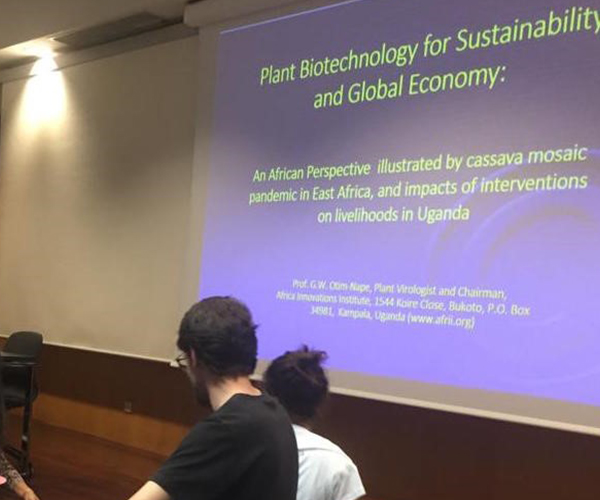Work Experience At Africa Innovations Institute (AfrII) Implementing Cascade Project
By Amiya Esther Keith
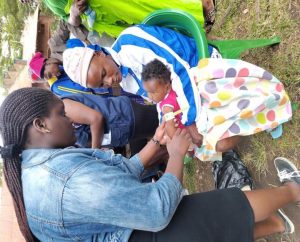
Esther screening a child for malnutrition during an integrated child health day hosted by Ministry of Health and supported by AfrIIi Fortportal city, Toro Subregion
Being my first time in Fort Portal, I was concerned about a lot of things, language, climate, meeting new people, working in an organisation for the first time. Putting all my anxiety aside, I embarked on my journey to Fort Portal and just as we were about to arrive, I was struck by a wave of coldness that I had never experienced before. I thought to myself “maybe the city is warmer”, not knowing that Fort Portal is nestled in the shadow of the Rwenzori Mountains.
Upon arrival, I was warmly received by the Care International team and Toro AfrII team, notably Mr. Wilson Kirabira and Ms. Mirembe Winnie. I was immediately oriented to familiarize myself with the organization’s goals, objectives, thematic domains, and core activities. I was also introduced to AfrII’s structural framework and key personnel, including extension workers and Community-Based Facilitators (CBFs). Eager to make the most of every opportunity.
I was immediately initiated into diverse range of activities from conducting food demonstrations and Social Behavioural Change Communications (SBCC) campaigns in schools and markets to engaging in hands-on garden work, training agricultural extension workers and CBFs, and participating in nutrition review meetings, reporting using mWater to mention but a few. This comprehensive experience provided me with invaluable all-round learning and development. I encountered no challenges collaborating with any member of the Africa Innovations Institute (AfrII) team, thanks to a highly supportive environment that fostered both my professional growth and formative development.
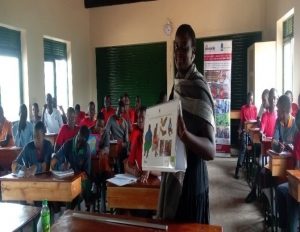
Esther holding a counselling session with students of Samling Peas Kicwamba High School
I derive great fulfillment from observing young children emulate the concepts that we taught them, and I take pride in facilitating community-led initiatives that drive meaningful transformation. It is a privilege to see the smiles and transformative change that AfrII brings to communities and to be a part of the team driving that transformation is an even greater honour. AfrII champions nutritional security for women by building their capacity across the entire food cycle, from sustainable production and hygienic preparation to healthy consumption. The benefits and impact of AfrII-CASCADE is beyond measure and above all it has educated communities on the complex dynamic of nutrition which has a foundational and long-term impact. I am deeply grateful to AfrII for the opportunity to be part of the incredible team and I want to give a special thank you to Ms. Winnie Mirembe, who has been much more than a supervisor, she has been a guiding mentor and a constant source of inspiration.

Construction of Keyhole gardens (Climate Smart Agriculture) in different schools
The author served as an intern with the CASCADE project at the Africa Innovations Institute.
Fostering Water Security and Catchment Resilience in Uganda’s Cattle Corridor (LDCF Uganda Cattle Corridor)
The Africa Innovations Institute (AfrII) is honored to be featured in New Vision (Page 26, 9th July 2025), in recognition of its pivotal role in promoting climate-smart and community-led solutions across Uganda’s livestock corridor. This recognition follows AfrII’s active engagement in the Stakeholder Consultation Workshop on Water Security and Catchment Resilience, held on 3rd July 2025 at Golf Course Hotel, Kampala.
Organized in collaboration with the Ministry of Water and Environment (MWE) and Conservation International (CI), the workshop marked a key milestone in shaping the design of the Fostering Water Security and Catchment Resilience in Uganda’s Cattle Corridor (LDCF Uganda Cattle Corridor) project. The initiative is supported by the Global Environment Facility (GEF) through the Least Developed Countries Fund (LDCF), with a grant of USD 7,598,165 and a projected co-finance of USD 54,774,000.
Objective:
To promote sustainable and climate-resilient land and water management in the Cattle Corridor of Uganda.
Project Components:
- Component 1: Inclusive access to safe and clean water for consumption and agricultural production through the adoption of climate-resilient water technologies/infrastructure
- Component 2: Promotion of resilient and sustainable alternative livelihoods of local communities
- Component 3: Strengthening policy coherence for climate adaptation at the local level
- Component 4: Enhancing the technical and institutional capacity of climate change and conservation institutions
- Component 5: Coordination, learning and knowledge management
- Component 6: Monitoring and Evaluation Framework
AfrII’s Role and Contribution
AfrII was instrumental in leading consultations in five target districts: Mityana, Rakai, Kole, Pader, and Kitgum, ensuring that the voices of local governments, civil society organizations, and communities were fully represented. These engagements helped surface local priorities and ensure that the project’s interventions are grounded in the realities of those most affected by climate challenges.
AfrII also provided technical leadership in data collection, facilitated inclusive dialogue, and ensured a strong focus on gender, capacity building, and ecosystem restoration.
Looking Ahead
AfrII remains steadfast in its commitment to bridging science, policy, and grassroots action. Through the promotion of sustainable land and water management practices, the institute continues to support long-term resilience and improved livelihoods across one of Uganda’s most climate-vulnerable regions.
New Vision Feature_AfrIIBreaking the Cycle: Transforming Lives through Community Support in Northern Uganda
By Aboth Matilda
In a small village in Adwoa Parish, Lira District, the lives of three people demonstrate how supporting women and marginalized groups in farming can transform entire communities. For years, women here have been responsible for feeding their families, but they often lack the money, tools and support they need to do this well. Men also struggle, often taking on difficult temporary jobs to make ends meet.
The CASCADE project implemented by the Africa Innovation Institute in the district, focused intentionally on supporting the “last mile woman”, the women who work tirelessly to feed their families but receive the least help. This gender-sensitive approach is helping shift long-standing power dynamics.
Awor Madoline used to be like many women farmers in her area, working hard but barely surviving. She farmed sunflowers using only hand tools and poor-quality seeds, which only gave her 400 kilograms per acre. This wasn’t enough to support her family and she felt trapped in a cycle of poverty.
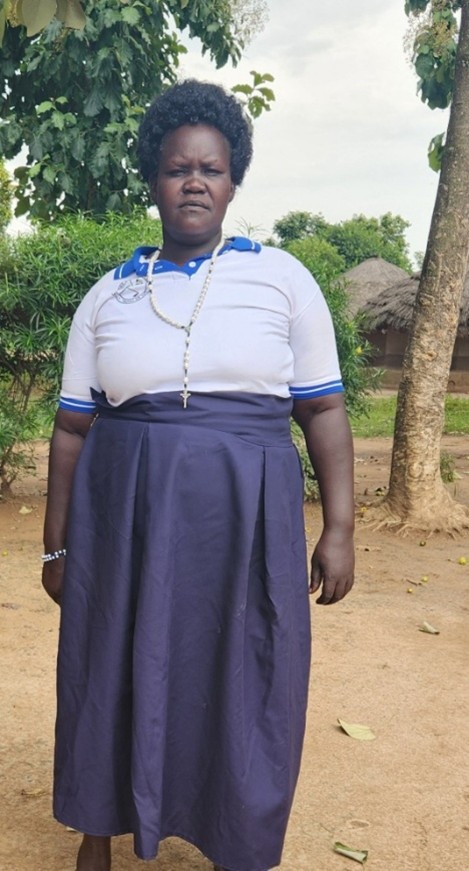
Awor Madoline CBF of AFRII- CASCADE in Adwoa parish, Ogur sub/county, Lira District.
Then CASCADE came to her community and chose her for training to become a community leader. This was unusual because in her culture, men usually take leadership roles in farming. But CASCADE challenged this norm, recognising that women’s lived experiences with food insecurity positioned them as powerful agents of change. They believed that women could be equally, if not more effective leaders, precisely because they intimately understand the daily struggles of feeding and sustaining their families.
Through the training, Madoline learned better farming methods. She discovered how to use improved seeds, better tools and proper farming techniques. The results were amazing; her sunflower harvest doubled to 800 kilograms per acre. This success changed everything for her family and gave her confidence to help others.
In addition to boosting her yields, Madoline also learned the importance of growing and preparing nutritious food for her household. With guidance from CASCADE, she began incorporating more diverse and nutrient-rich crops into her family’s meals, including vegetables and legumes. This shift significantly improved the health and well-being of her children, who previously suffered from frequent bouts of malnutrition. “I moved from hand hoes to ox plough. From selling poor quality seeds to quality seeds. That is transformation,” Madoline says. But her transformation wasn’t just about farming tools it was about becoming a leader in a community where women rarely held such positions.
CASCADE then trained Madoline to become a community-based facilitator, putting her in charge of helping 250 other farmers in her area. This was a big responsibility, but Madoline was ready. She had experienced the struggles herself and knew exactly what other farmers needed. Her role became a vehicle for empowering others, especially vulnerable women, who often face multiple layers of exclusion.
Among the farmers Madoline trained was 58-year-old Acio Milly, a mother of 14 children. Despite having land to farm, she couldn’t afford good seeds, organic fertilizer or proper tools. Every season was a struggle just to grow enough food to keep her large family from going hungry.
“I had land, but with limited resources to cultivate it properly,” Milly remembers. “Every season was a struggle just to survive. Like many women in her community, Milly carried the heavy responsibility of feeding her family but lacked access to loans or credit to improve her farming. She, like countless other rural women, had no access to formal financial services often excluded due to lack of collateral such as land or property, which is typically owned or controlled by men.
Madoline recognized that Milly was one of the most vulnerable people in their community. In 2024, she helped Milly join a local savings group connected to the government’s Parish Development Model program. This was crucial because women like Milly usually can’t get loans from banks, as they often lack property to use as security, and banks often don’t take women farmers seriously.
Through this program, Milly received 1 million Ugandan shillings (USD 270) as an affordable loan. But more importantly, she received training on how to use this money wisely. CASCADE’s approach isn’t just about receiving money; it is about equipping people especially marginalized groups with the knowledge to manage it effectively. This support included financial literacy and enterprise management, empowering them to make sound and sustainable business decisions.
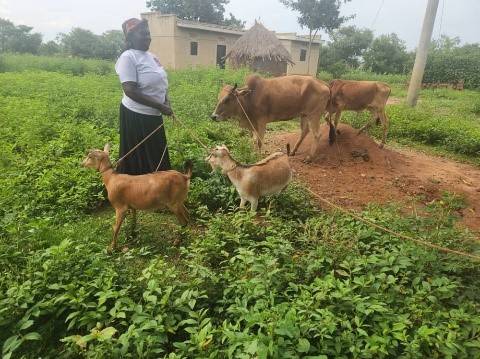
Milly taking her animals to graze.
Milly made very clever choices with her loan. She used 400,000 shillings to rent better land and buy improved maize seeds and organic fertilizer. Another 400,000 shillings was spent on purchasing a heifer and she used the remaining 200,000 shillings to acquire breeding goats.
With training on family nutrition under CASCADE, Milly also prioritized food security at home. She began using part of her maize harvest for home consumption, ensuring her children had daily access to healthy meals. The milk from her heifer added a vital protein source to their diet, contributing to a noticeable improvement in their energy and health.
The results were incredible. Within four months, Milly harvested 35 bags of maize – far more than she had ever grown before. She sold 15 bags to make money and used the profits to buy more goats. Her livestock also began producing milk and giving birth, creating even more income.
“Before PDM, I had land but with limited resources to cultivate it. Now I have seeds, animals and hope. I am no longer a beggar, I am an inspiration to the community,” Milly says proudly. Her transformation reflects the economic and social empowerment of rural women when given the tools, trust, and training.
The program also supported men in the community, like 59-year-old Yuventino Odongo, a father of six. For years, Yuventino had struggled to support his family through small-scale farming and casual labour taking on any temporary work he could find, like construction or farm work for other people.
This kind of work is tough and unreliable. Some days there would be work, other days there wouldn’t be. The pay was low and it was physically demanding. Yuventino wanted something better for his family but didn’t know how to break out of this cycle.
When Madoline identified Yuventino as someone who could benefit from the program, she helped him join the same savings group as Milly. He also received a 1-million-shilling loan and training on how to use it effectively. While the primary aim was empowering women, inclusive support ensured shared prosperity and balanced household decision-making.
Yuventino decided to focus on poultry farming raising chickens and turkeys. He used his loan to buy young birds, build proper shelters for them and purchase vaccines and feed to keep them healthy.
Within six months, Yuventino’s turkey flock had grown to over 24 birds. During peak seasons, he could sell mature turkeys for 90,000 to 120,000 shillings each (about $25-33). His chicken business also grew to over 30 birds, giving him a steady income from selling eggs and chickens.
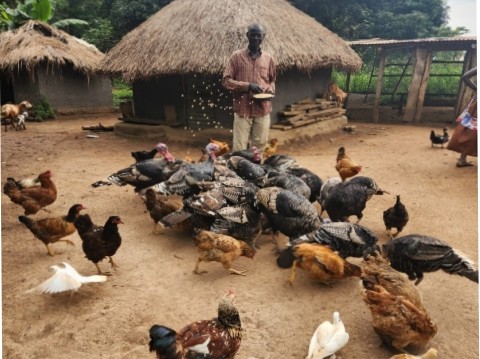
Yuvention feeding his birds.
“I used to admire poultry farmers from a distance. With PDM, I became one and even better, I now train others. I believe poverty can be defeated if we use opportunities well,” Yuventino explains. His success allowed him to stop doing casual labour and focus on his farming business. He even began teaching other men in the community how to raise poultry.
This story from Adwoa Parish represents one of many similar transformations occurring across CASCADE’s implementation areas. By linking 1,404 farmers to government programs across Acholi and Tooro regions, CASCADE demonstrates how community-based facilitation creates sustainable pathways out of poverty while strengthening local institutional capacity.
As CASCADE continues to strengthen its impact, this story from Adwoa Parish serves as powerful evidence that community-based facilitation, strategic government partnerships and targeted investments in women’s agricultural leadership can break the cycles of poverty and create lasting pathways to prosperity for rural communities in Northern Uganda. It reaffirms that investing in women’s leadership, inclusive training, and equitable access to resources is not only fair, it is transformative.
The Author is the Agronomy Officer at AfrII
Increasing youth inclusion in value chain agribusiness ventures
Representatives of Windwood Millers Limited (WML), at the, just concluded quarterly meeting for the end of the 2nd quarter of implementing the AfrII- WML- PSFU YAW Project titled ‘Increasing Income and Creating Job Opportunities for Youth in the Cassava Value Chain’. The project aims to create 5,214 decent and sustainable jobs for youths through the production and sale of 144,000 MTs of fresh cassava roots, and 6,000 MTs of soybeans, to WindWood Millers Ltd for processing into high-quality flour and other products for the markets. This project will enable WML to expand and stabilize its raw material supply, strengthen the supply chain and expand into bigger markets. This capability will thus enable the firm to offer decent job opportunities to young males and female youths engaged in the value chains.

Mr. Joseph Ochen and Ms. Angella Ajam (front row 2nd & 3rd) partook in the meeting held at the Sheraton Kampala Hotel to track the progress of project implementation. During the meeting also, a web-based data uploading system was launched in preparation for the 3rd quarter, where this system will be put to maximum use.
Partners on the nutrition CASCADE Project harmonize work plans for effective implementation
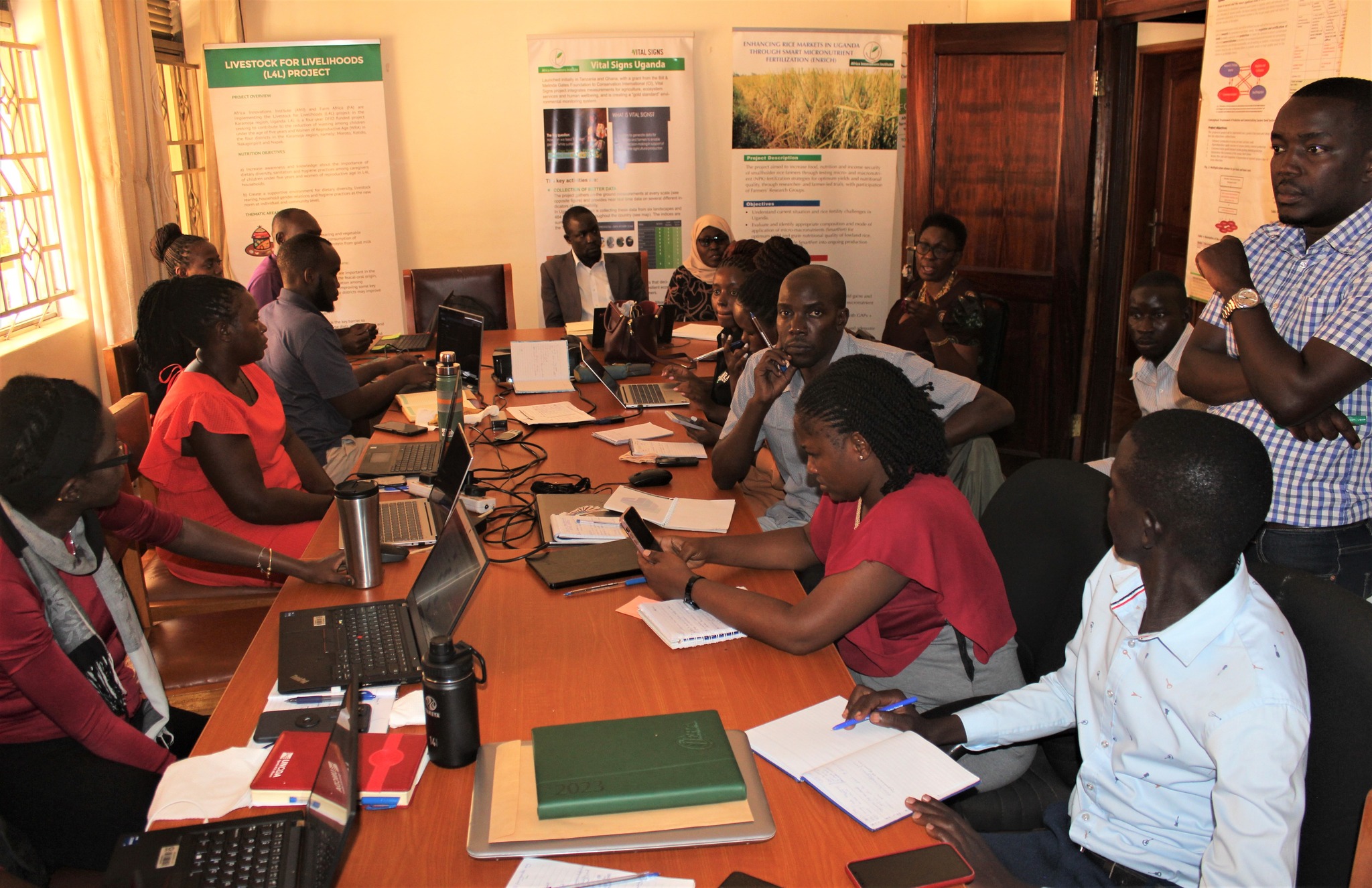
(By the door) Ms. Agnes Kirabo, the Executive Director-Food Rights Alliance addresses participants.
Tuesday 11th/04/2023 – The Africa Innovations Institute (AfrII) today hosted a project planning meeting to streamline and harmonize work plans and activities among partners to fast-track implementation of the CAtalyzing Strengthened policy aCtion for heAlthy Diets and resiliencE (CASCADE) project in the Karamoja, Acholi, and Tooro regions. Project partners from Food Rights Alliance (FRA), Kyambogo University (KYU) and AfrII presented their work plan for teams to explore areas of harmonization during the meeting being held in the AfrII Boardroom.
In attendance is AfrII CEO Prof. G.W. Otim-Nape, the Executive Director, Food Rights Alliance- Ms. Agnes Kirabo, The Project Coordinator-AfrII’s Dr. Muniirah Mbabazi, AfrII’s Nutrition and Innovations Manager for the CASCADE Project-Mr. Wilson Kirabira, Ms. Claire Atukunda-FRA Program Policy and Advocacy Manager, and other core project implementation team members from AfrII, FRA, and Kyambogo University.
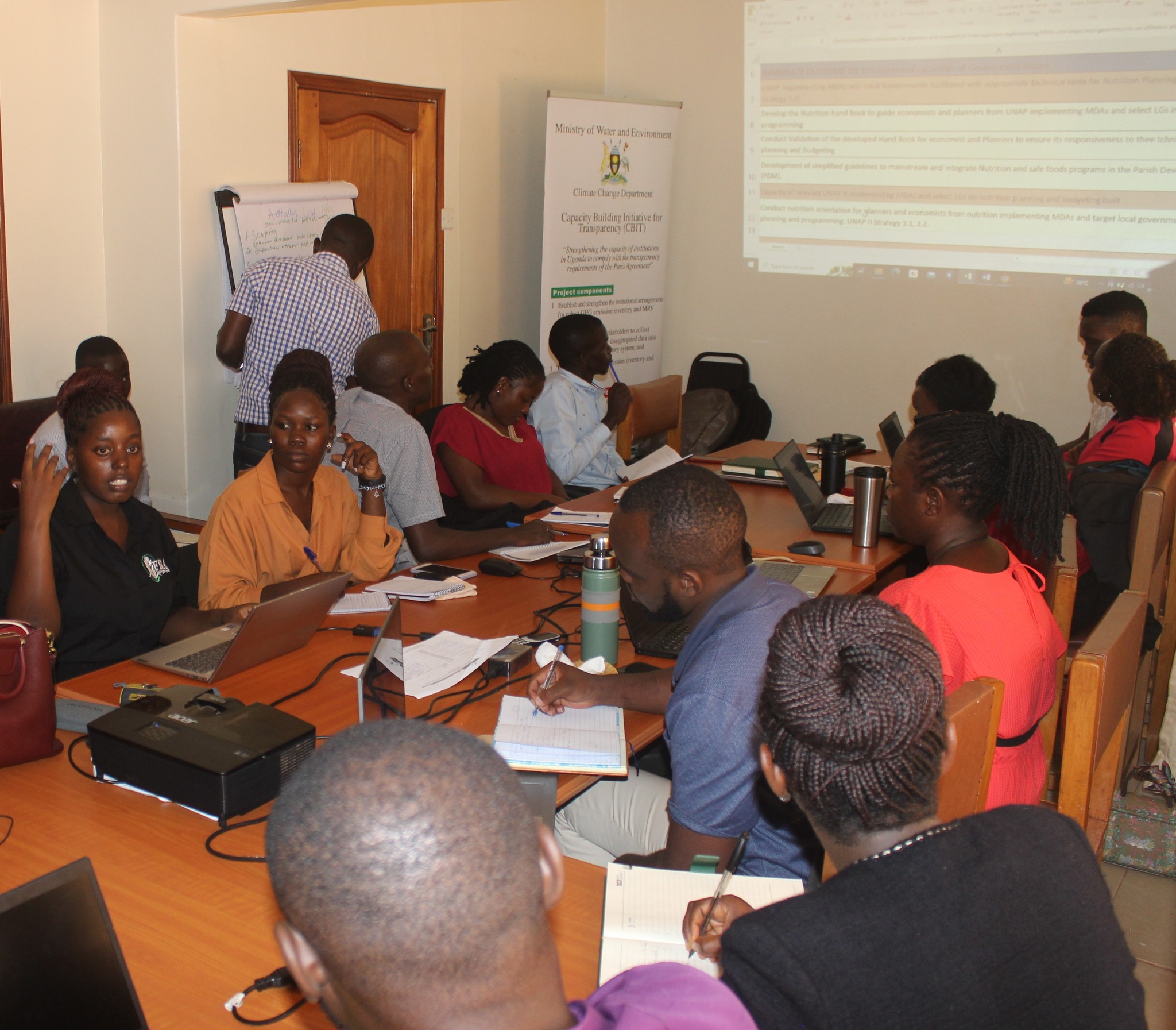
(Raised hand) Ms. Claire Atukunda-FRA Program Policy and Advocacy Manager briefs members during the meeting.
CASCADE is a multi-country project implemented in 6 countries in Africa including Uganda. The project aims to improve food security and contribute to the reduction of malnutrition of at least 1 million Women of Reproductive Age (WRA) and Children in Benin, Ethiopia, Kenya, Nigeria, Mozambique, and Uganda. In Uganda, CASCADE will be implemented in a selected 15 districts in the Acholi Region, Tooro region, and the Karamoja Region. These districts were selected owing to the high levels of malnutrition, poverty, and displaced populations. The CASCADE will be aligned with the Nutrition for Growth (N4G) commitments and Uganda’s UNFSS pathway to transform food systems and seeks to operationalize actions deemed to reduce malnutrition among women and children in the Uganda Nutrition Action Plan II (UNAP II). Under CASCADE, AfrII will implement domain 4 which seeks to strengthen women’s capacities to benefit from nutrition-related policies by enabling them to produce, prepare and consume healthy diets. Specifically, AfrII will implement strategic actions that seek to;
- -Increase women’s access to and control over resources to produce, prepare and consume healthy diets
- -Strengthen knowledge and skills of women small-scale producers on producing, preparing, and consuming healthy diets;
- -Increase households’ knowledge, attitudes and practices in nutrition and WASH specifically, food safety.
- -Support local agriculture extension systems with tools and modules promoting healthy diet preparation and consumption among female small-scale producers,
- -Support programmes aimed at improving nutrition outcomes of vulnerable populations and the organization of behavior change campaigns.
The CASCADE Project is funded by the Netherlands Ministry of Foreign Affairs through Care International
AfrII expands operations into Southern Africa under her new project ‘Agricultural Productivity Programme for Southern Africa’
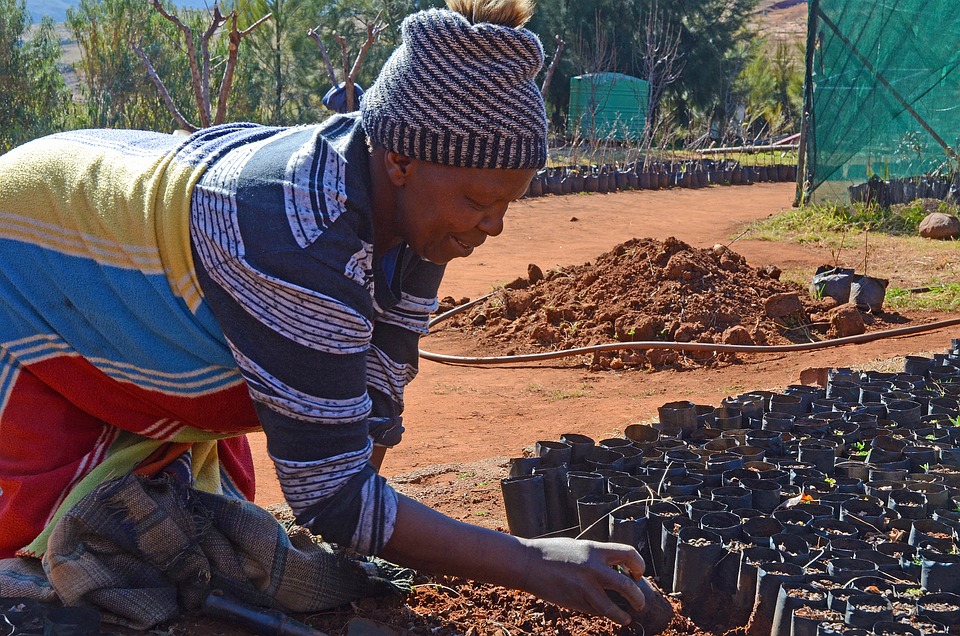
A female farmer in Lesotho happily tends to her nursery in preparation for planting.
Monday 6/02/2023 – The Kingdom of Lesotho’s Ministry of Agriculture and Food Security through the Department of Agricultural Research (DAR) has contracted a team of experts from the Africa Innovations Institute (AfrII) to deliver consultancy services for the joint ‘Agricultural Productivity Programme for Sothern Africa’ project. The consultancy will develop the Kingdom’s National Agricultural Research Policy including a clear road map and a business model for establishing a DAR semi-autonomous Institute for Agricultural Research; the development of the national science /research agenda and the national research and technology development strategic plan for an efficient implementation of the National Agricultural Research Policy.
The Uganda team led by the AfrII CEO, Prof. George William Otim-Nape will develop strategies and working policies to strengthen the National Agricultural Research System of Lesotho through research and innovations development. The consultants will produce and deliver documents including Inception report, Situation Analysis, Road map with narratives of the scenarios and change management strategy, a draft policy, draft National Agricultural Research and Development Strategy, draft Business Model for semi-autonomous DAR, and draft Instructions for the National Agricultural Research Act. They will work closely with different Government Ministries, national and regional institutions and donor and partner organisations that play a major role in the agricultural research arena.
The team of Uganda professionals with strong background in agricultural research and innovations systems and organizational development background was selected following a vital transparent screening process to conduct this consultancy. The Uganda team leader, AfrII’s Prof Otim-Nape is a celebrated plant virologist and former Director General of Uganda’s National Agricultural Research Organisation (NARO 2002-2005). During his tenure, he was instrumental in cementing the national research component; he established, directed and coordinated the operations of 12 Zonal Agricultural Research and Development Institutions (ZARDIs) located countrywide. Prof. Otim-Nape has 20+ years’ experience in agricultural research and innovations.
The consultants were recently engaged in a stakeholder’s validation workshop organized by the Department of Agricultural Research – DAR in the Ministry of Agriculture & Food Security, Kingdom of Lesotho, to share results from the Situation Analysis conducted. The team had close to a month long stay in Lesotho, and were engaged in a series of activities including conducting a situation analysis to identify major challenges and constraints, opportunities and a clear vision for the functional and effective national agricultural research system/innovation system. They will develop policy documents based on the outputs of the situational analysis and scenario whereby a clear implementation framework is proposed with targets and milestones for monitoring the policy enactment and its successful implementation; develop a science agenda for Lesotho, a clear roadmap and strategic plan for implementation of the policy recommendations for efficient and functional NARS, and also develop a national agricultural research policy. To this effect, a complete Situation Analysis report will then be submitted to the kingdom for further action.
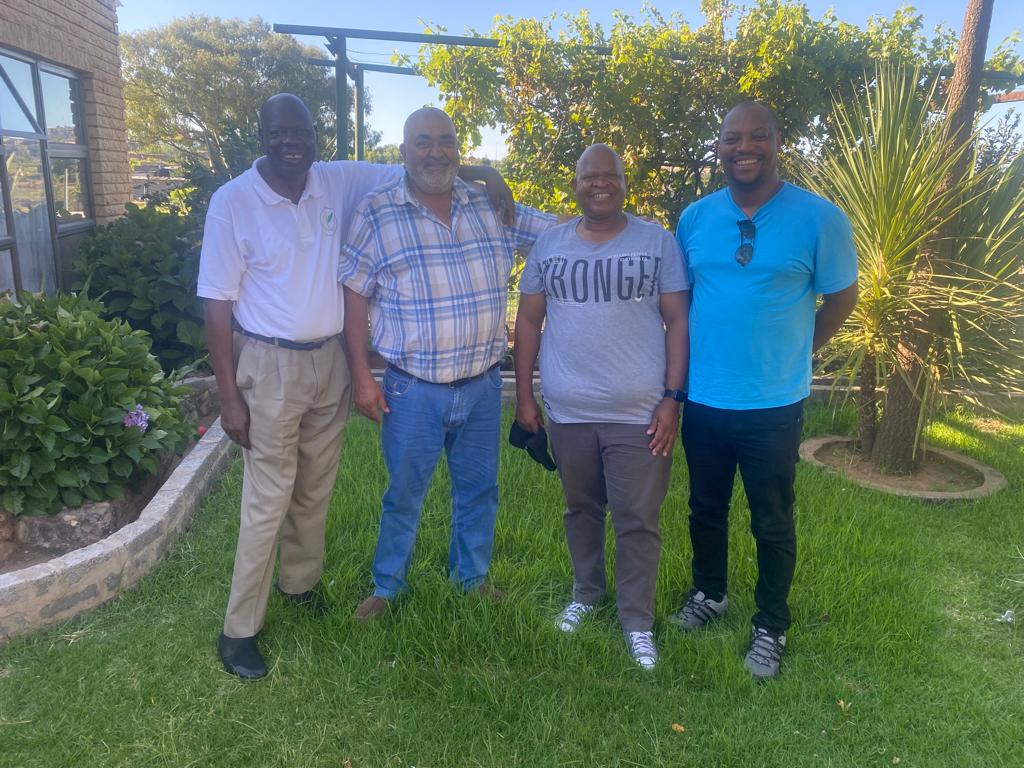
AfrII’s Prof. Otim-Nape (left) poses with friends from the Ministry of Agriculture and Food Security -Lesotho during his recent work stay in Lesotho
Background on the National Agricultural Research System of Lesotho
The Department of Agricultural Research (DAR) is one of the institutions that constitute the National Agricultural Research System (NARS) and is the apex research organization in the country expected to contribute significantly to economic growth through introduction, generation, adaptation, application and transfer of improved technologies. Alongside, the DAR is the National University of Lesotho which contributes significantly to research in the agricultural sector through student and academic research projects and initiatives in the crop and livestock sub-sectors.
Despite the various lined departments that constitute the DAR, it has however been shown that the research system has not been able to contribute efficiently and effectively to the achievement of the desired growth of the agricultural sector du e to inherent weaknesses of the DAR, which is to play a leading and coordination role in the NARS. Weak linkages between agricultural research output (by research organizations and academia) extension services and farmers have also been highlighted in previous initiatives. The NARS including DAR have been operating over the past years in a complete vacuum as far as research policy and regulatory framework is concerned. This is largely due to the fact that there is no national research policy and legal framework that sets the basis for the national research agenda. This vacuum has led to absence of efficient and effective efforts for research by the National Agricultural Research System and the associated organizing framework for the system. With regard to policy decision support systems, it appears that to a large extent, policy decisions on NARS-related issues are made without the benefit of proper processes and often not supported by regulatory frameworks. The establishment of DAR itself as a key component of the NARS was made with neither Policy nor legislation, resulting in a situation where the department has responsibilities with no authority, which would have been provided through legislative framework. It’s against the foregoing background that the establishment of a semi-autonomous National Research Institute/Council is being recommended to address the desire of the Government of Lesotho to have an agricultural research system that responds to the needs of stakeholders and contributes to poverty alleviations as well as drive economic growth through robust Innovation Systems that embrace the concept of Integrated Agricultural Research for Development (IAR4D). Such a system should not only exist by name but should be fully functional and well-coordinated with clear policy direction and mandate (national agenda) on research. It needs to be properly networked and should facilitate collaboration with national, regional and international research organizations for acquisition and dissemination of knowledge and technologies for the benefit of the farming communities and their advisory service providers.
AfrII and partners strategize to meet expected country targets towards the global nutrition-focused CASCADE project
Wednesday 1/02/2023 – The Africa Innovations Institute (AfrII) and partners from CARE International-Uganda have resolved to hold weekly project planning meetings to facilitate the fast-tracking and efficient implementation of the CAtalyzing Strengthened policy aCtion for heAlthy Diets and resiliencE (CASCADE) Project activities. This resolution, among others, was reached during a joint meeting yesterday at the AfrII premises in Bukoto, convened to discuss fast-tracking CASCADE implementation activities in Uganda. During these meetings, AfrII shall share updates on the progress of activities to ensure deadlines are met on time but also re-assess where changes need to be made. The outgoing Consortium Manager- CARE International in Uganda, Ms. Anja Feijter noted, a series of other meetings have been scheduled between CARE International –Uganda and the different partners on the project to check the progress of each regarding project activity implementation.
CASCADE is a multi-country project implemented in 6 countries in Africa including Uganda. The project aims to improve food security and contribute to the reduction of malnutrition of at least 1 million Women of Reproductive Age (WRA) and Children in Benin, Ethiopia, Kenya, Nigeria, Mozambique, and Uganda. In Uganda, CASCADE will be implemented in a selected 15 districts in the Acholi Region, Tooro region, and the Karamoja Region. These districts were selected owing to the high levels of malnutrition, poverty, and displaced populations. The CASCADE will be aligned with the Nutrition for Growth (N4G) commitments and Uganda’s UNFSS pathway to transform food systems and seeks to operationalize actions deemed to reduce malnutrition among women and children in the Uganda Nutrition Action Plan II (UNAP II). Under CASCADE, AfrII will implement domain 4 which seeks to strengthen women’s capacities to benefit from nutrition-related policies by enabling them to produce, prepare and consume healthy diets. Specifically, AfrII will implement strategic actions that seek to;
- -Increase women’s access to and control over resources to produce, prepare and consume healthy diets
- -Strengthen knowledge and skills of women small-scale producers on producing, preparing, and consuming healthy diets;
- -Increase households’ knowledge, attitudes and practices in nutrition and WASH specifically, food safety.
- -Support local agriculture extension systems with tools and modules promoting healthy diet preparation and consumption among female small-scale producers,
- -Support programmes aimed at improving nutrition outcomes of vulnerable populations and the organization of behavior change campaigns.

The CARE International-Uganda team led by the outgoing Consortium Manager, Ms. Anja Feijter (at the head of the table) during the CASCADE project planning meeting held in the AfrII Boardroom, Bukoto. AfrII’s CASCADE Project Coordinator, Dr. Muniirah Mbabazi (in blue headgear), and the Nutrition and Innovations Manager, Mr. Wison Kirabira (second on the right) in attendance.
CBIT -Uganda participates in the validation of the first biennial update report
CBIT- Uganda PMU joined technocrats from government Ministries departments and agencies to validate the first biennial update report (BUR1).
The 5-day validation meeting took place at Ridar Hotel Mukono from 17th to 21st June, 2019. It was hosted by the Climate Change Department (CCD), Ministry of Water and Environment. Participants in the 5-day meeting were from the Africa Innovations Institute, Ministry of Agriculture Animal Industry and Fisheries, National Forestry Authority, National Agricultural Research Organization, Ministry of Trade and Industry, Ministry of Energy and Mineral Development, Ministry of Local Government. The technical backstopping of the meeting was by BUR (Biennial Update Report) Task force members.
The aim of the validation meeting was to ensure that information and data shared in the draft BUR1 is a good representation of the ‘reality’ within the sectors that were represented and to discuss constraints and gaps. Each of the sectors was allocated a day for discussion; with only waste and industrial processes and product use (IPPU) sharing a day.
BURs are to be submitted by non-Annex I Parties to the United Nations Framework Convention on Climate Change (UNFCCC) once every two years. Their purpose is to provide updates on actions undertaken by a Party in implementing the convention. The report also provides updates on national GHG inventories; constraints and gaps in climate action and support needed and received.
Participants in the meeting were informed that Uganda was committed to submitting her BUR1 before the end of June 2019.
CBIT Uganda will use the findings of this meeting to support capacity building in the forthcoming project activities such as training on GHG inventory and reporting
AfrII builds collaboration with NOVA University of Lisbon
The AfrII Chairman, Prof. Otim-Nape, a visiting professor at NOVA University of Lisbon, Portugal, on Friday 24th May delivered a lecture, “How we applied biotechnology to resolve the cassava mosaic disease problem in Uganda” to plant biotechnology staff and PhD students at the University. A copy of his presentation is available here.
The Institute and University are in talks over collaboration on topics of mutual interest.
He is in Lisbon up to the 28th May 2019 and will engage in a few other meetings with potential partners during his visit.
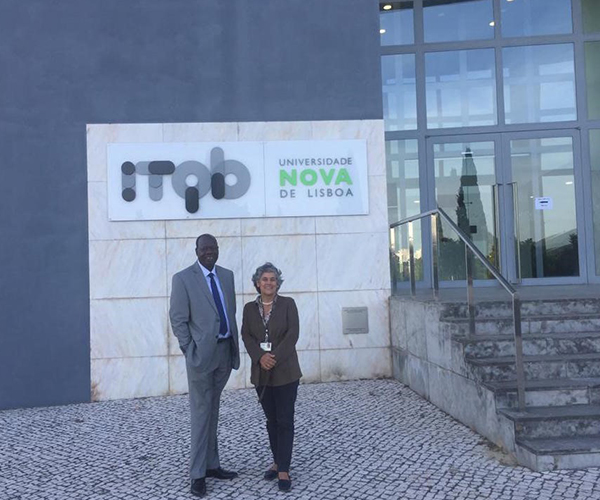
Prof. Otim-Nape in a photo with Prof. Margarida Oliviera of NOVA University Lisbon in front of the University building
Reporting Gender Dis-aggregated Data in climate action.
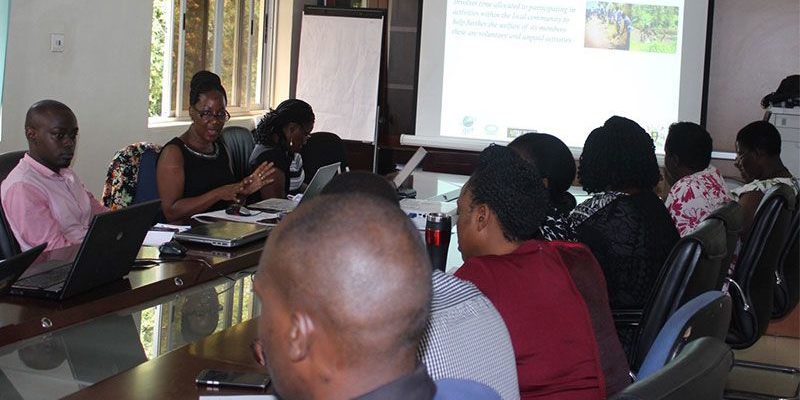
By Felly Tusiime, Sylvia Ayebare, Elizabeth Ahumuza, and Arthur Kimeeze

Participants at the CBIT write shop at the Ministry of Water and Environment-Climate Change Department.
May 2019– On 16th and 17th, the CBIT Uganda project hosted a two-day training write shop on analysis, reporting and publication of gender dis-aggregated data on climate change and GHG inventory at the Ministry of Water and Environment-Climate Change Department. 27 participants including 15 females and 12 males from the Climate Change Department, Ministry of Water and Environment; Ministry of Energy and Mineral Development; National Environment Management Authority and the Africa Innovations Institute attended the write-shop.
The training was conducted by gender consultants from Makerere University including Prof. Gorettie Nabanoga, Dr. Justine Namalwa, and Mr Anthony Tugaineyo, in three sessions:
- Gender related concepts;
- Gender Mainstreaming in GHG Inventory and
- Data collection, analysis and use of gender disaggregated data. The general approach to the training was participatory.
Gender related concepts.
The consultants led the participants through an open discussion on the differences between sex and gender concepts. It was clarified that ‘sex’ entails biological characteristics of male and female as identified at birth while ‘gender’ on the other hand was considered to entail the roles and responsibilities, rights and limitations ascribed by society and culture to males or females. The discussion clarified that gender roles are learnt and listed examples; reproductive roles, the productive roles, community roles and political roles.

L-R: Mr. Anthony Tugaineyo, Prof. Gorettie Nabanoga and Dr. Justine Namalwa, the gender consultants from Makerere University.
The discussion also addressed gender needs and these were clustered as either basic/ practical gender needs or as strategic gender needs. ‘Basic gender needs’ relate to working and living conditions such as health care, income, dwellings, food and water among others whereas ‘strategic needs’ relate to power and relations and change according to the specific social, economic and political situation an individual finds oneself in.
The discussion then took a turn to consider the question of gender equity versus equality. ‘Equity’ refers to both men and women having a fair chance of their needs being met while ‘Equality’ on the other hand refers to equal opportunity to access and enjoy socially valued goods, opportunities, resources and rewards by men and women. The session concluded with a discussion on the distinction between sex disaggregated data and gender disaggregated data. The major distinction was found to be in the ‘who’ and ‘what’ questions. While the sex disaggregated data seeks to know ‘who does what’; gender disaggregated data further seeks to answer the ‘why’ question. It explores reasons why the category of female and male relate to the socio-economic attributes e.g. religion, wealth, education etc.
After this session, the participants were invited to take part in an exercise with 2 sketch questions to lead the plenary and discussions thereafter:
- “Are the gender roles a connotation of the sex of the individual?”
- “Is gender equality attained after ensuring gender equity?”
These questions served as a thought bridge to the second session of the write shop: gender mainstreaming in the GHG inventory.
Gender mainstreaming in the GHG inventory.
This more practical session centered on the gender concerns in the GHG inventory and the steps in mainstreaming gender in GHG inventory. The steps in chronological order are:
- Prepare
- Process Planning
- Design and Data Collection
- Data Entry and Analysis; and
- Reporting
This session was guided by separate questions for the 5 target sector hubs and the Climate Change Department (CCD). The question directed specifically to CCD was, “What is expected in the national GHG inventory” while two questions were directed to the sector hubs
1) “What is expected in your sectoral GHG inventory” and
2) “Identify the sources and sinks of emissions in your sector.”
The practical exercise was extended to cover the questions:
- What activity data has been collected in your sector?
- What are the implications of unavailable activity data to the reporting requirements?
- What must be done to improve the accuracy of GHG emission computations?
To trigger a gender lens, the participants were further prompted to discuss and record/respond to the following:
- Identify the pertinent gender issues that relate to the sectoral GHG emissions.
- What gender dimensions (intersecting factors) have been addressed in the GHG inventory system?
- Which potential gender dimensions need to be addressed in the GHG Inventory process?
These discussions closed day 1 and were an entry point for session 3 of the write-shop.
Session 3 (day 2) covered the main steps in mainstreaming gender in the GHGI reporting process and the utilization of gender disaggregated information in reporting on transparency requirements. Representatives from the 5 target sectors; Agriculture, Water, Forestry, Waste, and Transport made presentations on the status of the GHG inventory process and proposed changes to engender the data collection process.
It was noted that all sectors needed to engender the GHG data inventory in order to make GHG and climate change reporting more informative.

Mr. Choice Agaba of NARO presenting results from the Agriculture sector during the needs assessment meeting at CCD
Key takeaways from the training write-shop for the participants included the need by all partners to understand gender and the related concepts in order to appreciate its relevance in the sectoral GHG inventory.
They were also made to understand that Gender is beyond the meaning of the word ‘sex’.
Also important was for them to note that every sector should have Standard Operating Procedures (SOPs) for the design and implementation of the inventory. These should include descriptions of the methodologies used in the estimations, data sources and the institutional arrangements for the preparation of the inventory.
All sectors were prompted to design new tools tailored to have gender disaggregated data for effective reporting on climate action.
The participants were made to appreciate the fact that gender analysis enables them to identify the change agents for addressing climate change and thus successful implementation of climate actions; GHG Inventory, progress made on delivering NDCs, Climate Change impacts and adaptation and capacity building, funds and technology transfer.
The reflections / practical questions delivered to the participants was intended to trigger actions to enable the sectors embrace the gender lens and in the planning and implementation of climate change actions. During the planning, ensure there is gender responsive budgeting to efficiently utilize gender disaggregated information.
The overall outcome of this very participatory training write-shop was positive, with interest and commitments from the sectors to apply lessons learnt, and committed themselves to put into practice, the knowledge and skills provided during the training to engender the national reporting systems on climate change action.
Special appreciation /acknowledgement for the successful play out of the training write-shop goes to the CBIT Project implementing partners; The Ministry of Water and Environment-Climate Change Department (CCD) and the Africa Innovations Institute. We also appreciate all participants / representatives that turned up for the training.
The CBIT Uganda project is equally grateful to the Global Environment Facility (GEF) and Conservation International (CI) for the funding support towards the success of the project activities in Uganda.

